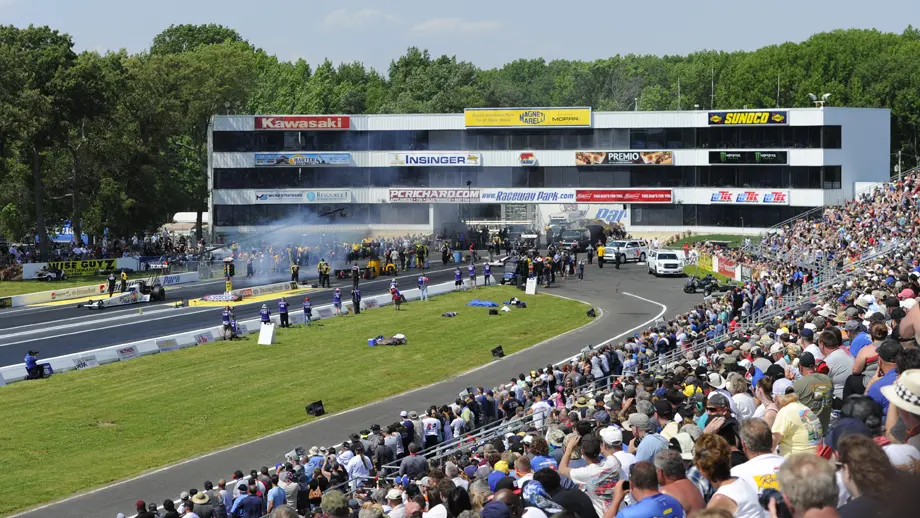
Imago
Credits – NHRA.com

Imago
Credits – NHRA.com
NASCAR has been on a mission to breathe new life into classic tracks. With fan and industry speculation swirling around venues like Chicagoland and Kentucky Speedway gaining momentum, and from the roaring resurrection of North Wilkesboro Speedway to Matt Tifft’s passionate revival of Mansfield Motor Speedway, the sport is experiencing a golden age of honoring its past.
Watch What’s Trending Now!
Coastal Plains Raceway is set for a triumphant return this August under Steve Zacharias, the promoter renowned for saving Florence Motor Speedway. The sport is also exploring fresh racing venues, such as the potential addition of a street course in San Diego. These moves reflect a broader strategy to reconnect with the sport’s roots and expand its reach.
Amid this resurgence, Raceway Park in Englishtown, New Jersey, stands at a pivotal moment. Since its opening in 1965, this storied raceway has been a Northeast motorsports cornerstone, hosting drag racing, motocross, and the prestigious NHRA Summernationals. Yet, recent developments have cast uncertainty over its future, raising questions about its ability to endure in a rapidly changing landscape.
Raceway Park’s racing glory to redevelopment roll call
As Adam Stern posted on X, the Old Bridge Township is evaluating a proposal to redevelop Raceway Park into 600 affordable housing units. This plan, spurred by New Jersey’s mandate to construct 146,000 affordable homes by 2035, would reshape the 534-acre property that has served as a motorsport haven for nearly six decades. Township documents outline a vision that blends retail and commercial spaces with housing, while preserving portions of the airpark and existing racing facilities.
“One of New Jersey’s oldest motorsport raceways could be redeveloped to make way for hundreds of affordable housing units. Old Bridge Raceway Park … became nationally known as a longtime host of the NHRA Summernationals.” – @NJDotCom https://t.co/Ahmb46lFos
— Adam Stern (@A_S12) July 15, 2025
Pressure to meet state housing requirements drives this redevelopment effort. Old Bridge must deliver 673 affordable units within the next decade, and non-compliance could trigger expensive legal battles. The township’s redevelopment push is rooted in New Jersey’s Mount Laurel Doctrine, which requires municipalities to provide their fair share of affordable housing under state law. Planning board member Erik DePalma captured the township’s dilemma, stating, “If it were up to me, I’d put up a ‘closed for building’ sign. It’s disgusting. If we don’t comply, we get sued. So in the end, we really don’t have a choice.”
This mandate leaves little room for negotiation, pushing the township toward drastic changes. But the track proponents recall its heyday. In 1968, the NHRA Springnationals debuted here, elevating the strip to national prominence. And by 1971, it was their permanent home. There were events that drew top fuelers and record crowds every June and July. Local businesses thrived on race weekends, from diners serving early-morning pit breakfasts to motels that filled with teams and fans alike.
However, due to decades of fading attendance and rising maintenance costs, the circuit struggled to balance its books. This made the developer’s offer of public-private funding almost irresistible to the town leaders. The Napp family, stewards of Raceway Park since its founding, fiercely oppose the plan.
In May 2023, they launched a lawsuit against the township, challenging zoning changes that would permit single-family homes on the site. They contend that the track remains an essential piece of the community’s identity and economic fabric, arguing that its loss would leave a void far beyond the racetrack itself.
The Napp family’s legal challenge to save Raceway Park
The Napp family’s legal action targets the township’s zoning adjustments, which they view as an unfair encroachment on their property. Having nurtured the Raceway Park for generations, their fight underscores a deeper clash between preserving history and embracing progress. Tensions are also felt across many other communities facing similar pressures.
Economically, Raceway Park has long bolstered Old Bridge, drawing crowds from the region and fueling local commerce through its events. Losing the track could ripple through the township’s finances, impacting businesses that thrive on race-day crowds. This potential downturn adds weight to the debate, highlighting the stakes beyond mere land use.
The lawsuit’s resolution could have a domino effect beyond Old Bridge. A victory for the Napp family might inspire other property owners to resist state-imposed mandates, while a township win could hasten Raceway Park’s transformation and signal a broader shift for similar sites across New Jersey. The outcome remains uncertain, but its implications will echo far into the future.








